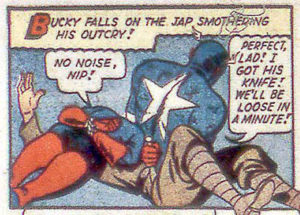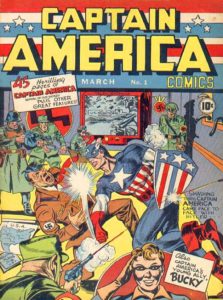Before any of this, know that an article much better, shorter, and funnier than this has already been written and brought to my attention, and I recommend it.
This is no way to run a web site, but fuck off, I do as I please.
We try to avoid the politics here these days, but we do free speech. So we’re at a crossroads. A real bone thugs situation here.
It’s a question that’s going around: Is it okay to punch a Nazi in the face? Or maybe, more accurately, should we be gleeful about a Nazi being punched in the face because it happened and we didn’t have to do it? Sort of like how it’s great to watch a couple have a very petty argument where you don’t have to be involved.
I was asked a better question today:
If you could, would you actively prevent a Nazi from being punched in the face?
That, to me, is a thinker.
~
“Nazi” has been the stand-in for “complete piece of shit” for quite some time now. When we want to say someone’s horrible, we compare them to Hitler, and/or we say the person is a Nazi. This swings both ways. All ways. A feminist might be called a “feminazi.” A white supremacist is called just a plan ol’ “nazi,” which they should work on. “Nazi Classic” maybe? Hell, even someone who is a stickler for grammar is called a “grammar nazi,” which is definitely pushing things a bit if you ask me. Grammar nazis are shitheads, but I haven’t seen anyone machine gunning people who comma splice into a flaming ditch.
All this to say, it makes the question of who is a “nazi” pretty complicated.
Hang in here for a second. I’m not going to defend any Nazis or say they’re not Nazis or get into those semantics.
What I want to do is ask the same question with a language swap:
If you could, would you actively prevent a complete piece of shit from being punched in the face?
~
I’m a big believer in free speech. Again, please hang with me for a second.
Being a believer in free speech puts a person, more often than not, in a really bad position.
Rarely are we in a position of defending speech that we agree with. Rarely do we discuss issues of speech when it comes to the successes of free speech.
It’s like this: one of the hardest things to do in a workplace is catch employees doing right. It’s easy to stop employees when they’re fucking up, but it’s hard to catch someone doing something the right way and praise them for it. An employee can do something well 100 times, and they’ll likely never hear a “Hey, good job.” Because they’re just being adequate. And when they fuck it up once, when transaction 101 happens and they fuck up, they’re going to hear about it.
I see the same issue when it comes to free speech. We talk about Nazis, we talk about Westboro, we talk about all these things, but we do not talk about the monumental achievements that are made possible on a regular basis because we can speak our minds and hold our own beliefs.
It’s hard to defend free speech because the concept is almost always defined by the moments when it’s very challenging. I’d like to turn that around for a second.
Think about your favorite album. Think about what in it is sexually suggestive, promotes drugs or alcohol, talks about violence, talks about crime, talks about anything that might be considered by someone to be unsavory.
And not something that’s considered unsavory by someone you trust. Just by simply, Someone. A faceless someone.
The scary way we think about the limiting of speech is to limit access to this album. And this idea of limited access IS scary because we’re really bad at it. When we’ve done this in the past, the work has been turned over to incompetent, ridiculous systems. The MPAA is inconsistent at best. The ESRB sucks. Recording Industry? Please. Not only do these institutions make terrible decisions, but these terrible decisions often come down harder on those who are already marginalized (sexual contact between two men in a movie is not weighed the same as heterosexual contact, for example).
The problem is that we turn over the regulation of speech to people who use rubrics and their own (mostly terrible) taste to categorize items, mostly ignoring speech items’ contexts, purposes, and intended audiences.
However, access to art isn’t the biggest issue. Which is hard for me to say because access to art is really important.
The scarier thing we often fail to talk about is whether or not your favorite album would exist at all if things were more limited. Would artists, knowing that certain thoughts and ideas would never see the light of day, ever record the things closest to their hearts? Maybe. But if they did so, they may as well record that tree falling in the woods.
Not only might it be more difficult to get access to your favorite album. It may never be created. It may be bastardized and dumbed down in order to be accessible to a wider audience, much as happens with film, that the artistic vision is clouded by a bunch of PG-13 bullshit. Punk music ceases to exist and is replaced by safe, marketable Avril Lavigne’s.
Now replace “album” with your speech of choice. Religion, protest, demonstration, novel. Letter to your congress person. Pick your poison.
Yes, there are some terrible uses of speech. And they are the byproduct, the runoff, of so many great things.
~
Here’s the thing. I hate that being someone who is a staunch believer in free speech means seemingly defending the actions of reprehensible people. I’m not a fan, personally, of most of the people who bring up their right to free speech. I don’t care for the views and expressions provided by the Nazis and the Milos and the Westboros of the world.
But what I’m getting at here is that I don’t see myself as a defender of the people who use the notion of free speech to hurt people, twisting the rules to their own purposes. I don’t see their ideas and causes as valid. When I defend speech, I think of it as defending all of the good things that free speech brings us. Trying to preserve what’s good.
~
I’m pessimistic in this way: I don’t believe in a system or group of people who can regulate speech effectively, eliminating that which is “bad” and being hands-off with that which is “good.” If there were one example I could look to where this was happening, I would be closer to believing, but I don’t know of a single example of a filtering method that’s effective in eliminating harmful, negative speech that’s without artistic merit while also leaving good ideas and expressions unshackled. I can think of multiple examples that are open to any and all speech, I can think of lots of examples where speech isn’t harmful and is also bland and clearly restricted, but I can’t think of an industry, a board, a committee, anything that can do this job for the entire world and do it right.
I don’t believe that partial, reasoned limitation of speech is possible.
Which brings us to the current system: the mob.
~
“Freedom of speech does not mean freedom from consequences.”
This is a common phrase used when expression that is hurtful, harmful, and perhaps not protected comes to light.
I have problems with this phrase. Not the phrase, the idea.
The idea is very true in practice. In the real world, this is true. You can’t say what you want without consequences. This includes hateful things, and it includes things that may be true but affect your hire-ability, ability to work, and social standing.
I would pose the theory that it’s because we believe in this phrase that we are willing to debate whether it’s okay to punch a complete piece of shit in the face.
This phrase does explain some of the good regulation of speech that happens. Some of what I can get behind. For example, Milo.
~
If you haven’t heard, Milo’s book contract has been canceled due to some heinous things he said. Things piled on some already heinous things he said.
As someone who is a big proponent of unlimited, free speech, I’m still okay with his book being canceled. Not because I think he shouldn’t be allowed to express, but because his book was being published by Simon & Schuster. SS (wait…SS? Damn it, you guys. You’re making this harder than it already is!) has every right to publish or not publish what they want. They are a business, not a charity, not a government entity.
No, I don’t think they were acting as free speech heroes by publishing Milo’s book. I think they were acting as a commercial enterprise.
No, I don’t think they were acting as free speech enemies by canceling Milo’s book. I think they were acting as a commercial enterprise.
While, for some, the removal of a book contract could be a severely limiting act, I think Milo is going to be just fine. He keeps getting gigs, his views are definitely available in the world. He’s certain to find another publisher, and as someone with a certain level of notoriety, he can easily self-publish. In 2017 I see this as far less problematic. If there’s an audience, then Milo can go ahead and prove SS wrong. He’s got everything he needs to do so.
While Milo may find it more difficult to make a living through the expression of his views, his views, themselves, are not being attacked or limited.
I have to acknowledge that this is a case in which the idea of free speech is being used and isn’t really applicable. We’re going to waste A LOT of time talking about this as a free speech issue. And maybe it is, but I just don’t see it.
And I’ll put this on front street: If Milo were, say, a worker at Wal-Mart, and if he were fired for his beliefs, I would feel differently about that.
Your right is to the freedom of speech. There’s no guarantee regarding the commercialization of your speech. You have the right to your beliefs, but you don’t have the guaranteed right to make money from them.
~
I wanted to bring up Mr. Nazi and Milo because they are both people I disagree with, both presenting freedom of speech issues, and because I feel differently about both.
Milo’s issue isn’t freedom of speech. It’s about commerce.
Mr. Nazi’s issue is about freedom of speech. It really is. As much as I hate what he says, I think that what I’m saying here is accurate.
Having your book canceled is not a freedom of speech issue. Being punched in the face is.
~
Let’s talk about why this punching question matters.
Let’s start with “Freedom of speech does not mean freedom from consequences.”
My question is…what DOES freedom of speech mean, in that case? What’s left? What sorts of speech are okay, then?
And let’s go positive again, and by positive let’s talk in terms of the current political landscape.
I think peaceful protestors SHOULD be able to protest without consequences. I don’t think your boss should be able to fire you because you were at a protest on a Saturday. I don’t think the police should be able to pepper spray you. Freedom of speech being freedom from consequence, to me, means that you should be able to stand on a street corner with a protest sign and be given the same consideration and benefit of the doubt as someone standing on that same street corner who doesn’t have a sign.
I think you should be able to tell Trump jokes and make your Trump photoshops without finding yourself in hot water. If you’re doing this on your own time, your boss shouldn’t be able to fire you. Someone who is very protective of the office of the President should not be allowed to punch you in the face.
I think you SHOULD be able to park your car in any parking lot, and regardless of the political views expressed by your bumper stickers, I think you should be able to walk into a shop without fear that your car will be vandalized or damaged.
I think a football player should be allowed to address the National Anthem as he chooses.
And I think most people would agree with me here. Which says, to me, that what we really want isn’t free speech. What we want is freedom of speech when the speech is positive. What we want is limitation of speech when we see it as negative.
What we want is the right to punch Nazis in the face. We see that as the “consequence” of expression, but we don’t want consequences to fall on the puncher, which is why this belief system doesn’t work. If we see the punch as a very radical form of speech (which is a stretch, but okay), we do not apply the same logic. If we see the punch as the expression, then where are the consequences? Because, surely, if we believe in consequences for expression, that’s a form of expression likely to bring down consequences.
~
“Freedom of speech doesn’t mean freedom from consequences.”
There are a lot of problems with this phrase.
Who decides, then, what sorts of speech violate that freedom?
Who decides what the appropriate punishment is?
Who decides when the person who has made a violation has paid for it enough? Who stops the world and says, “Enough is enough”?
How are these decisions made in a fair, equitable manner?
This phrase allows for the punching of Nazis. It’s very attractive that way. But it’s also problematic because it’s a very open-ended, case-by-case phrase, and the decisions are made by whoever yells the loudest.
My question to anyone using that phrase is this: Have you ever, even once, used that phrase to defend the actions of someone working against a form of speech that you believe in? Have you ever used that phrase to defend police officers who pepper sprayed a mostly well-behaved crowd? Have you ever used that phrase to explain why someone expressed road rage because of your bumper stickers? If you were fired from your job for an Instagram photo your boss found scandalous, would you accept this firing by telling yourself, “Hey, freedom of speech doesn’t mean freedom from consequences”?
I would hope that you wouldn’t. I would hope that you wouldn’t blame yourself in these cases. And I don’t think you would.
But, until we use this phrase to also defend actions that clash with speech we agree with and promote, then it just doesn’t seem reasonable.
~
Here’s the other obvious problem:
If we’re okay with the punching of a Nazi in the face…how outraged and shocked can we really be when a Nazi punches someone else in the face? If we (and I’m including myself in this “we” as in “we who are not Nazis” and talk about this stuff online) set the level of discourse at the low bar of suckerpunching being kinda funny, then…
This is hard to say, but aren’t we (myself included) all a little responsible for this? Not the person who was punched, I’m not going down that road. I mean all of us who condoned the previous punch. If we all joke and laugh about Person A being punched in the face for his (awful, misinformed) beliefs, are we not then demonstrating, just a bit, how we feel about Person B being punched in the face for her (presumably very different) beliefs?
Of course we aren’t! We don’t see it that way because we are us. You’re you. You know the difference! You and me, we’re better than all the idiots out there.
To put it another way, we’re above it all. We can judge because we know what’s right. We know what’s best. If only the whole world would listen to us. Give us a couple hours, we can come up with a list of people and scenarios where punching is acceptable socially, even if it’s not acceptable legally.
We’re not just a couple voices in the chorus. We’re totally different. And if the rest of the world can’t see that, it’s THEIR problem.
Look, dripping sarcasm aside, I know that most of us see ourselves as these nuanced, shades of gray people. We know that it’s not just a matter of yes/no, okay to punch and not okay. But the rest of the world doesn’t see us that way. The world sees us, you and me, as the same as everyone else. Which is to say, people who say yes to punching and people who say no.
Call me a realist or call me a pessimist. I am an ant. One of very many who appear very much the same to everyone else. One tiny voice who, I think, will be seen to the whole huge world as someone lucky to express something as simple as yes or no.
Which is why I choose No.
~
I don’t disagree with these sentiments. But I also think this same thing about the original nazi puncher.
There is no world where this is acceptable. I hope [he] has him arrested. He can learn about bullying from behind bars.
~
Here’s who I’m condemning: Punchers. Anyone who thinks it’s okay to go out and punch someone based on their beliefs and ideas. Period. Not acceptable. It doesn’t particularly matter to me who was punched and who did the punching. Just tell me that someone was punched for the expression of their beliefs and I will tell you that I think something has gone terribly wrong.
And here’s what I’m also condemning: Freedom from speech does not mean freedom from consequences. Let’s stop using that phrase. It’s tidy, it’s neat, and it’s false.
~
A friend said to me, “What about speech where you say something that’s true but hurtful? What if your girlfriend asks if she looks fat in an outfit and you said ‘yes’? Shouldn’t there be consequences?”
My friend is right and she’s wrong.
She’s right in that there WILL be consequences. There probably SHOULD be consequences. I am free to say what I want, but there will be consequences.
But my friend is wrong because if I DID say my girlfriend looked fat in an outfit, and if my girlfriend socked me in the face, I would think that was way too extreme a response. As unacceptable as I would find it for one partner to tell another they look fat, I think the response of suckerpunching the answering partner is way out of line.
If this situation went down, I don’t think I could stay with my girlfriend. I don’t think there’s much future in a relationship where someone can really paste you one.
Let’s flip it. I don’t care how cruel my girlfriend was, I wouldn’t punch her in the face. If I did, I don’t think it would matter, to me or anyone else, what my girlfriend had said 30 seconds before. There’s nothing she could say that meant she deserved a punch in the face.
But see, this is the thing. It’s a one-on-one relationship. I’m as much a part of setting the tone as she is. We work things out together. I don’t have the option to run into her apartment, scream that she looks fat and run away. She doesn’t have the option to run into my apartment, say something hurtful (“You’re not very good at Castlevania!) and run away. We see each other as parts of the relationship, and we have a desire to maintain the relationship.
Nazi beliefs do not allow for seeing everyone as part of our relationship as humans. Neither does punching a Nazi in the face.
Is my friend right in that there will be and probably should be consequences if I call my girlfriend fat? Yes.
Do I think those consequences should include being punched, losing my job, and do I think that the entire world should weigh in on it and decide who was right and who was wrong? No.
~
Quick aside: My girlfriend looks great in everything, has only elbowed me in the face once and it was an accident. I have also punched her in the face once, and it was an accident as well. When I say “accident” I don’t mean we were blinded by rage. I mean fumbling around in the darkness that resulted in a misplaced appendage. We’ve managed to get over these incidents.
~
Let’s get back to Nazis.
It’s kinda blurry, so the text reads:
He is a human being and so he can treat you badly only because, somehow, he is afraid of you or of what you might do to him. If you try to stop him by using violence and by “getting even,” he will be sure he is right in being afraid of you.
This is from a comic book called Martin Luther King And The Montgomery Story. It’s a good read, especially the end which discusses the “Montgomery Method.”
I really do think that a Nazi sees himself as a radical. As an outsider. Being punched in the face only confirms that status for him. And, to address the recent incident, being jailed for punching someone while the person who punched a fellow nazi is free, this is also exactly aligned with the way the nazi sees the world.
A Nazi sees himself as worth notice, as someone famous, as someone who is standing up for a belief. As someone persecuted. This is a classic narrative. How many movies have we seen where the “hero” is the lone voice, one of very few who isn’t afraid to stand up despite great personal consequences?
Being punched in the face cements in the Nazi’s mind that he is the “hero” of this story.
A Nazi’s schtick is some bullshit about how it’s not safe to walk around the city in broad daylight. When a Nazi is punched on camera with multiple witnesses around, and when the puncher is not caught and prosecuted…are we not validating a point that we do not want to be validated?
~
Can we talk more comics for a second?
This image keeps popping up
as a defense against punching Nazis. Captain America did it!
Here are a couple other things from Captain America comics. Just for funsies:

I love comics. Don’t get me wrong.
But when a comic cover that’s over 50 years old is providing you the best example of why punching someone is okay, I think we probably need to do a little more thinking.
~
Since we’re talking about punching, I thought a boxing metaphor might be appropriate.
In a boxing match, you want to set the pace, the speed at which things are happening. If you control that, you control the match. You control your opponent.
It comes down as micro as breathing. You set the pace for your breaths. Breathe when you punch. Breathe when you block. Breathe, and whatever you do, don’t limit your breaths to only those moments when your opponent lets you take them. Don’t turn over control of the pace to your opponent. Don’t let your opponent tell you when to breathe.
Empathy is in short supply. Which I get. There’s a lot of demands on our empathy right now.
That said, the beauty of empathy is that it’s a decision that I have control over. I don’t get to decide a lot of things in life, but whether or not I feel empathetic towards another person is my choice. Not theirs.
I breathe when I want to. Not when someone says to.
It’s almost empathy as an act of aggression. I have the power. But, the second I raise a fist, I’ve turned over the power to someone else. That person, the person who gets punched, if I laugh and cheer, if I do the punching, that person now owns my empathy. Not me.
The moment I let someone else tell me it’s okay to punch someone in the face, I’ve lost control.
That person is telling me when to breathe now. They’re setting the pace.
I refuse to surrender my empathy, my choice, to someone else.
I refuse to let someone who punches another person in the face set the pace, just as I refuse to let someone with reprehensible beliefs set the pace.
Empathy is a fight for me. And the way I win fights is by setting the pace.
~
Here’s how I choose empathy: Yes, I would prevent a complete piece of shit from being punched in the face. Not because I think that person is good, but because I would like to think I’d prevent any human from being punched in the face. I think it’s wrong in the moment, and upon reflection, still think it’s wrong.
Here’s the other way I choose empathy: It’s fine if you disagree with me. I’m not expecting you to agree with me. I think what I wrote here was more about me working out how I felt than it was trying to persuade you to think a different way.





